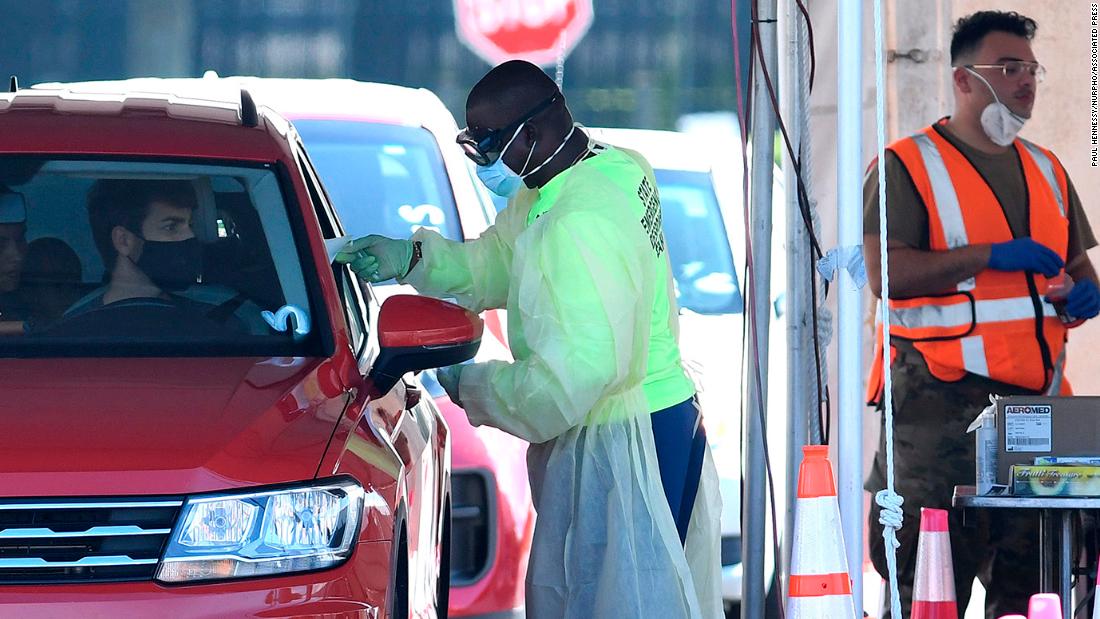As Covid-19 cases surge in the US, health experts say the months ahead will be the most challenging of the pandemic
With all the previous and current measures to offset the spread of the virus, “the country is fatigued with restrictions,” said Fauci, director of the National Institute of Allergy and Infectious Diseases, said during an interview on “60 Minutes” Sunday night.
“We want to use public health measures not to get in the way of opening the economy, but to being a safe gateway to opening the economy,” Fauci told CBS News Chief Medical Correspondent Dr. Jonathan LaPook during the interview.
“So instead of having an opposition, open up the economy, get jobs back, or shut down. No, put shut down away and say ‘we’re going to use public health measures to help us safely get to where we want to go.’ “
He added that it’s not safe yet to say the country is “on the road to essentially getting out of this.”
Only Missouri and Vermont recorded a more than 10% improvement in the average number of reported cases over the past week, according to the university’s data. Cases in Connecticut and Florida, on the other hand, increased by 50% or more.
Twenty-seven states saw spikes between 10% and 50%: Alabama, Arizona, Colorado, Georgia, Idaho, Illinois, Indiana, Iowa, Kansas, Massachusetts, Michigan, Minnesota, Mississippi, Nebraska, Nevada, New Jersey, New Mexico, North Dakota, Ohio, Rhode Island, South Carolina, South Dakota, Texas, Washington, West Virginia, Wisconsin and Wyoming.
New cases are static in the remaining states.
“This really is a harrowing time, and people have to be careful,” epidemiologist Dr. Abdul El-Sayed said.
‘This surge has the potential to be way worse’
On Friday, 10 states reported their highest one-day counts: Colorado, Idaho, Indiana, Minnesota, New Mexico, North Carolina, North Dakota, West Virginia, Wisconsin and Wyoming, according to Johns Hopkins.
As infections rise, so, too, have hospitalizations. In New Mexico, hospitalizations have increased 101% this month, Gov. Michelle Lujan Grisham said.
More hospitalizations will likely be followed by a rise in daily coronavirus deaths, said Dr. Francis Collins, director of the National Institutes of Health.
“When we saw this kind of transmission earlier on in the pandemic, in March and April, the virus hadn’t seeded everywhere. … This surge has the potential to be way worse than it was than either the spring or the summer,” El-Sayed, Detroit’s former health director, said.
State leaders push new restrictions
Americans can help get the virus under control, experts say, by heeding guidelines touted by officials for months: avoiding crowded settings, keeping a distance, keeping small gatherings outdoors and wearing a mask.
“This is a good moment for people to stop and ask themselves: ‘What can I do to try to be sure that we limit the further infections that otherwise seem to be looming in front of us as cold weather is kicking in and people are indoors, and those curves are going upward, in the wrong direction?'” Collins said Friday.
Nebraska Gov. Pete Ricketts announced changes to the state’s health measures, including requiring hospitals to reserve at least 10% of staffed general and ICU beds for Covid-19 patients.
CNN’s Christina Maxouris, Jason Hanna, Dave Alsup, Chuck Johnston, Andrea Diaz, Nakia McNabb, Samira Said, Nadia Kounang, Andy Rose and Shelby Lin Erdman contributed to this report.
![]()




